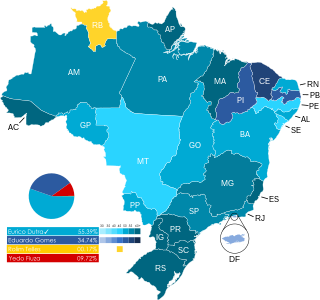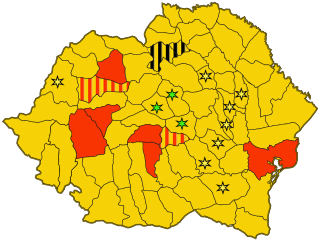Parliamentary elections were held in Greece on 25 September 1932. All 250 seats in the Lower House of the Greek Parliament, the Chamber of Deputies, were elected, as well as one-third of the seats in the Senate. The outcome was an ambivalent result for the two biggest parties, the Liberal Party of Eleftherios Venizelos and the People's Party. The People's Party received a plurality of votes in the Chamber of Deputies elections, but won fewer seats than the Liberal Party. The Liberals also won the most seats in the Senate.

General elections were held in Romania in December 1937. The Chamber of Deputies was elected on 20 December, whilst the Senate was elected in three stages on 22, 28 and 30 December. Voting was by universal male suffrage, making them the last elections held before women could vote.

General elections were held in Belgium on 20 November 1921. The Catholic Party, emerged as the largest party, winning 70 of the 186 seats in the Chamber of Representatives. Voter turnout was 91%.

General elections were held in Brazil on 2 December 1945, the first since the establishment of Getúlio Vargas' Estado Novo. The presidential elections were won by Eurico Gaspar Dutra of the Social Democratic Party (PSD), whilst the PSD also won a majority of seats in both the Chamber of Deputies and the Senate. Voter turnout was 83% in the presidential election, 81% in the Chamber elections and 73% in the Senate elections.
Parliamentary elections were held in Colombia on 14 March 1982 to elect the Senate and Chamber of Representatives. The result was a victory for the Liberal Party, which won 104 of the 199 Chamber seats and 55 of the 114 Senate seats.

Parliamentary elections were held in Venezuela on 8 November. Democratic Action won a plurality of seats, winning 61 of the 207 seats in the Chamber of Deputies and 21 of the 54 seats in the Senate. Voter turnout was 54.5% in the Senate elections and 52.7% in the Chamber elections.

Full general elections were held in Belgium on 14 October 1894, with run-off elections held on 21 October 1894.
Full general elections were held in Belgium on 2 June, 1912.

Senate elections for a third of chamber were held in the Czech Republic on 13 and 14 November 1998 with a second round on 20 and 21 November.

Parliamentary elections were held in Brazil on 15 November 1970. The result was a victory for the National Renewal Alliance Party, which won 223 of the 310 seats in the Chamber of Deputies and 40 of the 46 seats in the Senate. Voter turnout was 77% in the Chamber of Deputies election and 78% in the Senate election.
General elections were held in Romania between 1 and 3 March 1922. In the first stage between 1 and 3 March, seats in the Senate were elected. In the second stage between 5 and 7 March the Chamber of Deputies was elected, and in the third and final stage from 9 to 11 March, additional Senate seats were elected. The result was a victory for the governing National Liberal Party, which won 222 of the 372 seats in the Chamber of Deputies and 111 of the 148 seats in the Senate. Both houses were combined to form a Constitutional Assembly, which approved the 1923 constitution.

General elections were held in Romania in May and June 1926. The Chamber of Deputies was elected on 25 May, whilst the Senate was elected in two stages in May and 10 June. The result was a victory for the governing People's Party, which, together with the allied Romanian National Party, Magyar Party and German Party, won 292 of the 387 seats in the Chamber of Deputies and 107 of the 115 seats in the Senate elected through universal male vote. With some exceptions, the Peasants' Party and the main branch of the National Party ran on common lists under the name of National Peasant Bloc.

General elections were held in Romania in July 1927. The Chamber of Deputies was elected on 7 July, whilst the Senate was elected in three stages on 10, 12 and 14 July. The result was a victory for the governing National Liberal Party (PNL), which won 318 of the 387 seats in the Chamber of Deputies and 92 of the 110 seats in the Senate elected through universal male vote.
General elections were held in Romania in June 1931. The Chamber of Deputies was elected on 1 June, whilst the Senate was elected in three stages on 4, 6 and 8 June. The result was a victory for the governing National Union, an alliance of the National Party, the National Liberal Party, the German Party, the Agrarian Union Party, the Vlad Ţepeş League, the Agrarian League and several other parties. The Union won 289 of the 387 seats in the Chamber of Deputies and 108 of the 113 seats in the Senate elected through universal vote. The five seats won by the Communist-dominated Peasant Workers' Bloc were ultimately invalidated by the new Parliament.
General elections were held in Romania in July 1932. The Chamber of Deputies was elected on 17 July, whilst the Senate was elected in three stages on 20, 24 and 26 July. The result was a victory for the governing National Peasants' Party-German Party alliance, which won 274 of the 387 seats in the Chamber of Deputies and 104 of the 113 seats in the Senate elected through universal male vote. Of the 274 Chamber seats, 265 were taken by the National Peasant's Party and nine by the German Party.
General elections were held in Romania in December 1933, the third in three years. The Chamber of Deputies was elected on 20 December, whilst the Senate was elected in three stages on 22, 28 and 29 December.
General elections were held in Romania in June 1939. The Chamber of Deputies was elected on 1 June, and the Senate on the following day. They were the first elections since the introduction of the royal dictatorship of King Carol II under the 1938 constitution. Voters were presented with a single list from the National Renaissance Front, which had been the only legally permitted party in Romania since December.
Parliamentary elections were held in Colombia on 16 March 1958 to elect the Senate and Chamber of Representatives. They were the first elections held under the National Front agreement, which only allowed the Conservative Party and the Liberal Party to contest the elections, and allocated 50% of the seats in both houses to each party. As a result, the main contest at the elections was between factions within each party.
Parliamentary elections were held in Colombia on 27 October 1991 to elect the Senate and Chamber of Representatives. The result was a victory for the Liberal Party, which won 87 of the 161 seats in the Chamber and 56 of the 102 seats in the Senate.

Parliamentary elections were held in Chile on 6 March 1949. Although the Social Christian Conservative Party received the most votes in the Senate elections, the Liberal Party won the most seats, whilst the Radical Party remained the largest party in the Chamber of Deputies.










